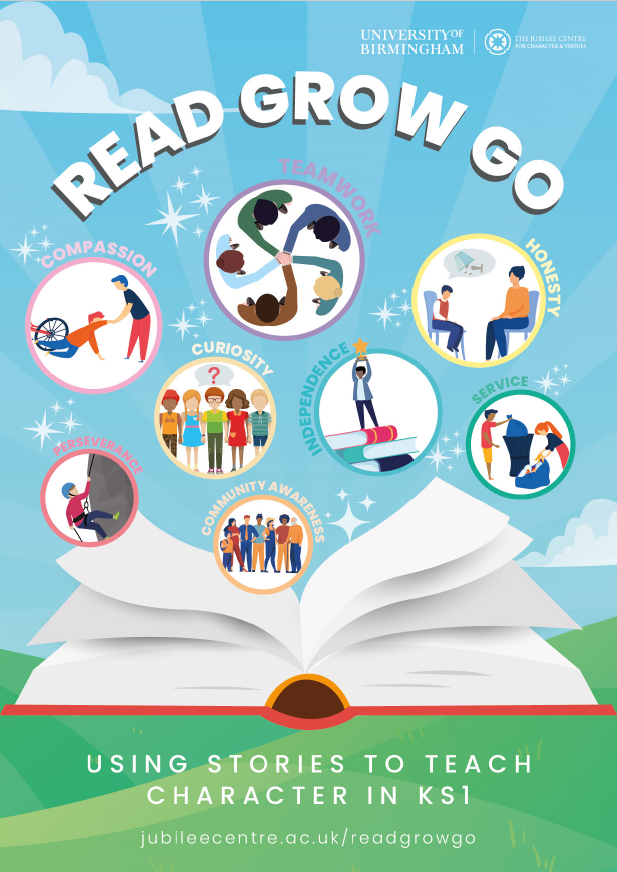
By Catherine O’Leary, Research Fellow
Jubilee Centre for Character & Virtues, University of Birmingham
As we face another period of time where many children across the nation are not in school, let’s take this opportunity to reflect back to The National Literacy Trust survey that took place in 2020. The survey determined the impact that the first lockdown had on the reading habits of 4,141 pupils from 51 schools in the UK.
The report found that pupils were both reading more and enjoying reading more during the first national lockdown; a finding made all the more significant since pupils’ self-reported enjoyment of reading had reached a 15-year low before the pandemic began. It seems that prolonged time spent at home encouraged pupils to discover – or re-discover – the wonder of literature, both in creating imaginary worlds and in helping to make sense of the particularly challenging world we currently find ourselves in.
This report coincided with the launch of a book club by Manchester United and England footballer, Marcus Rashford, who wishes to promote the ‘escapism’ experience of reading to pupils across all socio-economic backgrounds. By partnering with Macmillan Children’s Books and working alongside children’s authors, Rashford aims to create books which reflect his own life, covering themes such as the value of education, positivity, and understanding culture, and using these stories to challenge how pupils see themselves and who they would like to become.
It was against this backdrop, in 2020, that the Jubilee Centre launched its resources for pupils aged 5-7 years old – ‘Read Grow Go‘. Each lesson in the programme uses a story as a stimulus to teach a different character virtue, focusing on: compassion, honesty, curiosity, independence, teamwork, perseverance, community awareness and service. These virtues, taken from the four building blocks of character found in the Jubilee Centre’s A Framework for Character Education in Schools, are arguably more relevant now than ever before, as even the very youngest pupils have had to adapt and play their part during these difficult and demanding times. The lessons provide teachers with resources, practical activities and questions that promote class discussion and individual reflection on each of the virtues in turn. Each lesson follows a structured approach which is summarised below:
READ – A story is shared with the pupils who are challenged to work out what the virtue in focus is.
GROW – Class discussion and reflection followed by a pupil activity to reinforce the virtue.
GO – Pupils are encouraged to apply the character virtue to their own lives.
This is not the first time the Centre has produced resources which use stories to teach about character; the ‘Knightly Virtues’ project developed and trialled an intervention based on teaching character to KS2 pupils through classic stories. Building on the success of the ‘Knightly Virtues’ project, ‘Read Grow Go‘ encourages young pupils to explore virtuous behaviour through stories and to develop a deeper understanding and wider appreciation of virtues, eventually leading to them being applied to their own lives.
Since each lesson has at its heart a story, it was crucial that the texts chosen were of high quality and relevance. A report published by the Centre for Literacy in Primary Education titled, Reflecting Realities: Survey of Ethnic Representation within UK Children’s Literature 2018 found that, whilst 33.1% of pupils of school age are of minority ethnic origins, only 4% of children’s books had a Black, Asian or Minority Ethnic main character, highlighting a lack of fictional role models for a large proportion of pupils. This drew attention to the need for not only high quality, but also inclusive, relatable texts to be part of this programme. As such, the selection process for finding texts involved seeking recommendations from primary teachers, English Educational Consultants, and Primary ITE providers, to source books that were suitable, diverse, and represented different aspects of society, whilst, crucially, promoting particular character virtues.
Given the positive findings from the National Literacy Trust survey and the positioning of reading in the national spotlight – thanks to high-profile public figures such as Marcus Rashford – it is hoped that this set of resources will provide teachers with the inspiration to continue to harness one of the greatest resources they can offer their pupils on their journey of character development; the power of the written word.
All of the ‘Read Grow Go‘ lesson resources are now available for teachers to download from the Jubilee Centre website. Feedback is welcomed from teachers who use the resources and should be emailed to: c.m.oleary@bham.ac.uk
For further reading recommendations for children focussed on discussing and exploring virtues, please visit our parent resources.
References
- Centre for Literacy in Primary Education (2018). Reflecting Realities: Survey of Ethnic Representation within UK Children’s Literature [online] [Accessed 9 Dec. 2020]
- Clark, C. and Picton, I. (2020). Children and young people’s reading in 2020 before and during lockdown [online] The National Literacy Trust. [Accessed 9 Dec. 2020]
